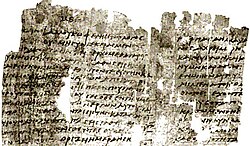Papyrus 13
|
New Testament manuscript |
|
 |
|
| Name | P. Oxyrhynchus 657 |
|---|---|
| Text | Hebrews 2:14-5:5; 10:8-22; 10:29-11:13; 11:28-12:17 |
| Date | 225-250 |
| Script | Greek |
| Found | Oxyrhynchus, Egypt |
| Now at | British Library/Egyptian Museum |
| Cite | Grenfell & Hunt, Oxyrynchus Papyri 4:36-48. (#657) |
| Size | 12 columns of scroll; 23-27 lines/column; pagination legible: 47-50, 61-65, 67-69. |
| Type | Alexandrian, often agrees with Vaticanus; 80% with Papyrus 46 |
| Category | I |
| Note | largest papyrus other than Chester Beatty collection |
Papyrus 13, designated by siglum 13 or P13 in the Gregory-Aland numbering, is a fragmented manuscript of the New Testament in Greek. It was copied on papyrus in the 3rd century at approximately 225-250 CE.
Papyrus 13 was discovered by Bernard Grenfell and Arthur Hunt in Oxyrhynchus, Egypt. It is currently housed at the British Library, Inv. Nr. 1532, and Egyptian Museum, SR 3796 25/1/55/2 (11), or PSI 1292.
The surviving text is twelve columns, of 23 to 27 lines each, from a scroll. This is all from the Epistle to the Hebrews, namely 2:14-5:5; 10:8-22; 10:29-11:13; 11:28-12:17. Its presence of pagination 47-50 means that Hebrews was preceded by only one book in the original scroll, likely the Epistle to the Romans as in Papyrus 46. It is the largest papyrus manuscript of the New Testament outside the Chester Beatty Papyri.
It was written on the back of a papyrus containing the Epitome of Livy and some scholars think the manuscript was possibly brought to Egypt by a Roman official and left behind when he left his post.
...
Wikipedia

